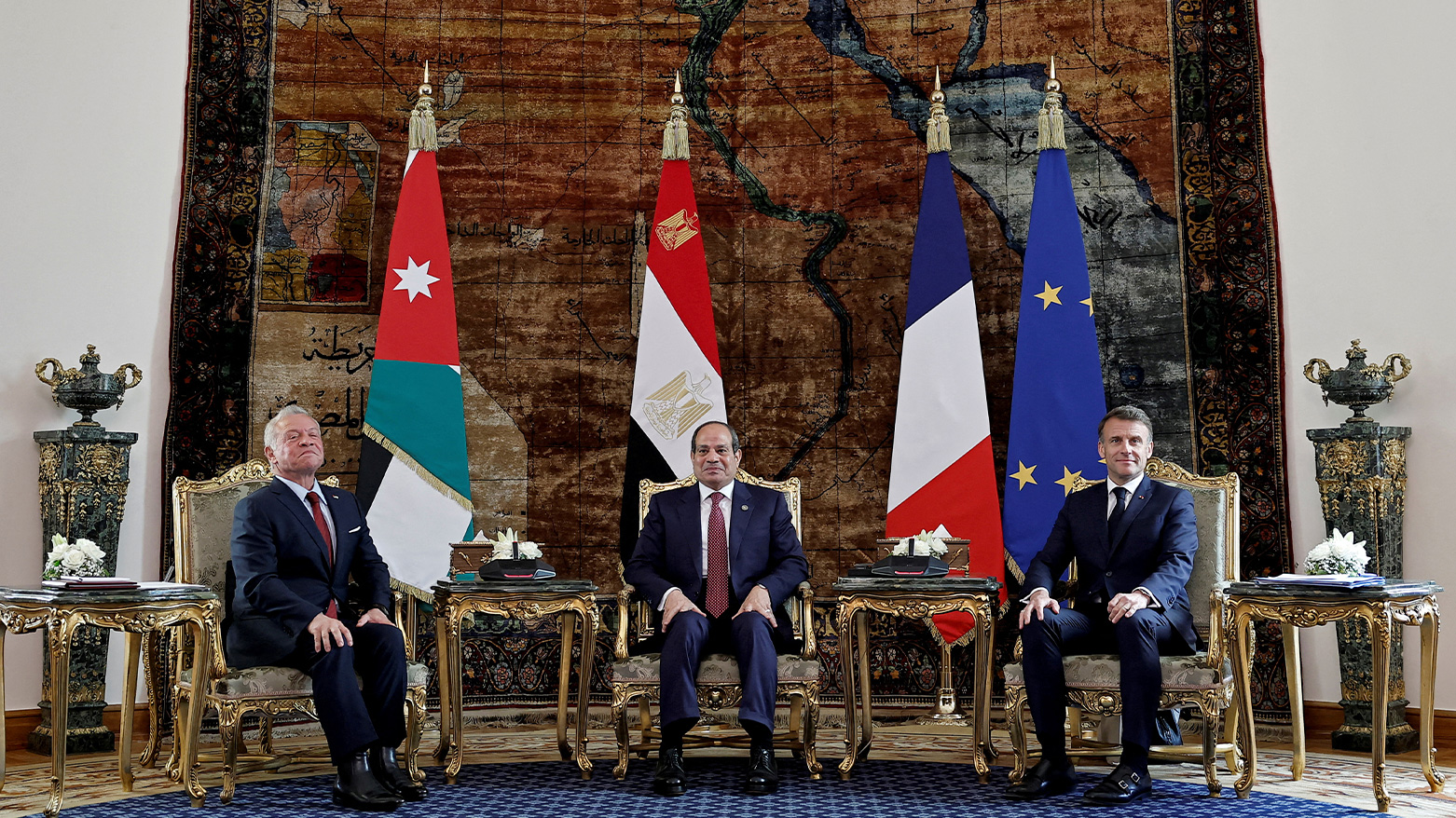‘Hamas Must Be Entirely Excluded from Governance,’ Macron
Standing alongside Egyptian President Abdel Fattah al-Sissi and Jordan’s King Abdullah II, Macron announced France’s full backing for the Arab-led reconstruction plan for Gaza, insisting that the Islamist group responsible for the October 7 attacks on Israel “must no longer pose a threat to Israel.”

By Kamaran Aziz
ERBIL (Kurdistan24) – As Israeli Prime Minister Benjamin Netanyahu and U.S. President Donald Trump solidified their alliance in Washington on Monday, French President Emmanuel Macron delivered a sharply contrasting message from Cairo, underscoring the urgency of a humanitarian ceasefire in Gaza and declaring unequivocally that Hamas must be excluded from any future governance of the war-ravaged enclave.
Standing alongside Egyptian President Abdel Fattah al-Sissi and Jordan’s King Abdullah II, Macron announced France’s full backing for the Arab-led reconstruction plan for Gaza, insisting that the Islamist group responsible for the October 7 attacks on Israel “must no longer pose a threat to Israel.”
“Hamas must be entirely excluded from governance,” Macron stated during a joint press conference, a declaration that set the tone for the day's regional diplomacy.
According to reports by Le Monde and Le Figaro, the French President’s remarks came during a whirlwind diplomatic summit in Cairo designed to counter the Israeli-American axis and revive momentum for a two-state solution. Macron’s visit marked a clear strategic pivot toward deepening Arab-European alignment, particularly with Egypt and Jordan—two of Israel’s few Arab neighbors with formal peace agreements.
The summit occurred as Netanyahu landed in Washington to discuss a controversial post-war plan for Gaza with President Trump, who continues to champion a dramatic restructuring of the territory that could include the displacement of Palestinians and the transformation of the coastal enclave into what he described as a “Middle Eastern Riviera.”
The proposal—rejected by Arab leaders and viewed as a potential violation of international law—drew rebukes from both Macron and Sissi. “We firmly oppose any population transfer and the annexation of Gaza or the West Bank,” Macron warned, describing such steps as grave threats to regional security, including Israel’s own.
At the heart of the Franco-Arab summit was a call to immediately resume humanitarian aid to Gaza, which has been halted by Israel since March 2. The leaders also demanded a renewed ceasefire and laid out a framework for Gaza’s future. “Governance, law enforcement, and security in Gaza—and all Palestinian territories—must be exclusively handled by a strengthened Palestinian Authority,” the joint statement declared.
According to Le Figaro, Macron reinforced France’s support for the reconstruction plan adopted by the Arab League on March 4 in Cairo, which envisions a $50 billion international effort over five years.
While both Washington and Tel Aviv have rejected the proposal, Macron emphasized that the plan “opens the way to a new governance model” for Gaza. Egypt, battered economically by Red Sea disruptions and heavily reliant on U.S. aid, has championed the initiative in the face of mounting American pressure.
A phone call from Cairo to Trump, placed jointly by Macron, Sissi, and King Abdullah II, was intended to present the unified Arab-European stance before Netanyahu’s White House meeting. According to the Le Monde report, the leaders urged Trump to support a ceasefire, unblock humanitarian corridors, and begin laying the groundwork for a viable political settlement.
“We need an Arab and Islamic consensus before presenting the plan to the Trump administration,” an Egyptian diplomat told Le Figaro.
The Trump-Netanyahu meeting in Washington presented a competing vision. While Trump expressed willingness to explore diplomatic solutions, he reiterated his preference for a bold restructuring of Gaza, even hinting at possible annexation.
Yet Macron, along with his Arab counterparts, positioned their alternative as the only legitimate and stabilizing pathway forward.
Despite Macron’s calls for excluding Hamas, the group continues to resist political marginalization. A Palestinian source cited by Le Figaro stated that in response to Israel’s most recent military offensive, Hamas has hardened its stance, refusing both disarmament and the exile of its leadership.
In a striking omission, Palestinian Authority President Mahmoud Abbas was absent from the Cairo talks. With speculation mounting over his future, Macron and his Arab allies discussed the need for a political transition that could rejuvenate the Palestinian Authority and enable it to assume full control of Gaza after a six-month transitional phase.
On Tuesday, Macron and Sissi were expected to travel to El-Arish, near the Rafah border crossing, where the humanitarian crisis is most acute. The visit underscores Macron’s desire to spotlight the suffering of Gazans while reinforcing France’s diplomatic weight in the region.
As reported by Le Monde, France is also exploring the option of recognizing Palestinian statehood, though Macron has stopped short of committing to a timeline. His broader objective is to host a United Nations conference on the Middle East before the G7 summit in Canada this summer—potentially co-chaired with Saudi Crown Prince Mohammed bin Salman.
While the road to peace remains fraught, Macron’s bold assertion that “Hamas must be excluded” signals a shift toward a more assertive European role in the post-war reconstruction of Gaza—and a clear challenge to the hardline approaches now dominating U.S.-Israeli diplomacy.